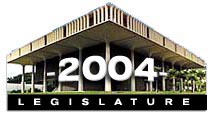
Dems quash ‘ice’ veto
Lingle and Aiona call the bill
flawed and say it could worsen
the drug problem
Democratic legislators quickly overrode Gov. Linda Lingle's veto of a drug-abuse bill that had been the product of a series of community meetings and debate during the summer.
CORRECTION
Thursday, May 6, 2004State Sen. Bob Hogue has called House Bill 2003, a drug-abuse bill, "too slanted towards treatment instead of law enforcement." A story on Page A7 Saturday incorrectly quoted Hoque as saying the bill was "too slanted towards treatment instead of punishment."
The Honolulu Star-Bulletin strives to make its news report fair and accurate. If you have a question or comment about news coverage, call Editor Frank Bridgewater at 529-4791 or email him at corrections@starbulletin.com.The action came less than 12 hours after Lingle announced that she was rejecting the bill.
Lingle and Lt. Gov. James "Duke" Aiona formally announced yesterday the decision to veto the bill, House Bill 2003, predicting it would "exacerbate the problem of 'ice' or crystal methamphetamine abuse in Hawaii."
Ice crackdown
The "Ice Bill," officially known as House Bill 2003, House Draft 1, Senate Draft 1, includes the following:» Emphasis on treatment for students, first-time drug offenders, and parole and probation violators.
» Higher mandatory minimum sentences for ice trafficking.
» Tougher penalties for manufacturing and distributing ice.
» Opportunity for families to obtain court-ordered drug treatment for addicts.
» Overrides of county zoning laws to allow drug rehabilitation homes in residential areas.
In the House, the vote to override was 35-13, with only Republicans supporting the governor. The Senate voted 19-4, with four GOP senators opposing the override.
Rep. Eric Hamakawa, House Judiciary Committee chairman, criticized the Lingle administration for not coming in with its own plan.
"The administration has nothing but a plan to do more planning," said Hamakawa (D, Hilo-Kurtistown). "We must do something now. We cannot wait another year. We cannot wait for another study."
In response, Rep. Galen Fox (R, Waikiki-Ala Moana), House Republican leader, said the Democrats' bill was flawed.
"This bill is fake reform and should be opposed on that basis," he said. "Beyond that, this seems to be a bluff on the subject on being tough on the crackdown on ice."
In an attempt to defend Lingle's veto, Sen. Bob Hogue (R, Kaneohe-Kailua) said the Democrats' bill "was too slanted towards treatment instead of punishment."
Lingle did allow to pass into law without her signature a bill that provides $14.7 million in drug-abuse funds, including money to expand the Drug Court program.
Although Lingle and Aiona said the drug-abuse bill included favorable provisions, it reduced the penalty for manufacturing ice by making it "less than the penalty for manufacturing of dangerous drugs."
"If this bill were enacted into law, manufacturing small amounts of every dangerous drug except ice would be a Class A felony," Lingle said in her veto message.
Aiona, a former Circuit Court judge, who had held his own series of summer community meetings, said the problems of drug addiction are long term.
"Ice, unfortunately, has been with us for the last 10 years," Aiona said.
"It has evolved and created problems that cannot be solved within three or four months," he added. "It something that takes time and development."
But lawmakers dismissed Aiona's thinking, saying the Lingle administration had no plan at all.
"The governor's response to crystal meth is that we need to study this for another year. The Legislature said, 'We are going to deal with it now,'" Rep. Scott Saiki, Democratic leader, said after the veto.
Saying there "is no silver bullet or easy answer," Aiona said the administration was "in the process of refining ways of looking for efficient and effective ways of combating the problems."
The veto drew a quick rebuke from Sen. Colleen Hanabusa, Judiciary chairwoman (D, Nanakuli-Makua), who said Aiona should have come up with his own legislation.
"Just because the lieutenant governor has chosen not to act is no reason to veto this bill," Hanabusa said.
"It is a very easy position to be in, to sit there and take potshots because you can't come up with something yourself," she charged.
Lingle also objected to provisions that allowed community drug programs to be set up in residential areas without regard to city zoning.
Lingle said the zoning exemption provision concerns Honolulu Mayor Jeremy Harris, who asked for a veto.
Eric Crispin, city Planning Department director, said the bill would violate home rule because the state proposal overrode the county zoning laws.
Crispin explained that the city allows for drug rehabilitation homes but provides for a public hearing before the permit is granted.
However, House Vice Speaker Sylvia Luke said Crispin had testified in favor of the measure earlier in the legislative session.
